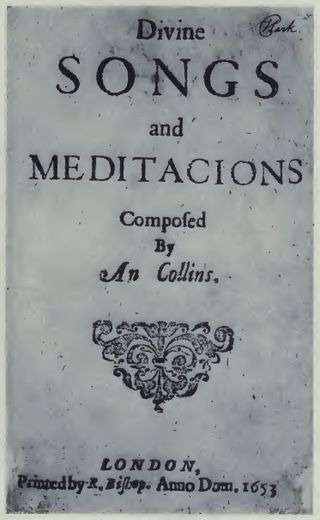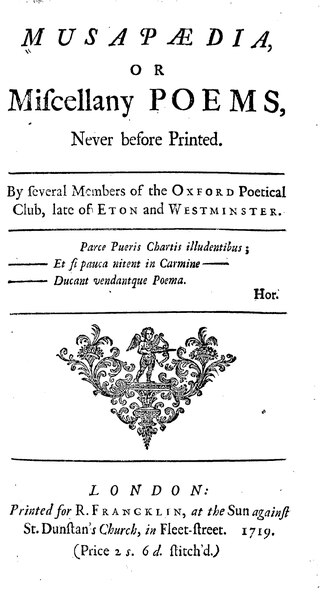Related Research Articles

Hannah More was an English religious writer, philanthropist, poet, and playwright in the circle of Johnson, Reynolds and Garrick, who wrote on moral and religious subjects. Born in Bristol, she taught at a school her father founded there and began writing plays. She became involved in the London literary elite and a leading Bluestocking member. Her later plays and poetry became more evangelical. She joined a group opposing the slave trade. In the 1790s she wrote Cheap Repository Tracts on moral, religious and political topics, to distribute to the literate poor. Meanwhile, she broadened her links with schools she and her sister Martha had founded in rural Somerset. These curbed their teaching of the poor, allowing limited reading but no writing. More was noted for her political conservatism, being described as an anti-feminist, a "counter-revolutionary", or a conservative feminist.

Yolande of Valois, also called Yolande of France, was Duchess of Savoy by marriage to Duke Amadeus IX of Savoy, and regent of Savoy during the minority of her son Philibert I of Savoy from 1472 until 1478.

Lady Mary Wroth was an English noblewoman and a poet of the English Renaissance. A member of a distinguished literary family, Lady Wroth was among the first female English writers to have achieved an enduring reputation. Mary Wroth was niece to Mary Herbert née Sidney, and to Sir Philip Sidney, a famous Elizabethan poet-courtier.
Felicity Riddy is an academic, author and specialist in late-medieval English and Scottish literature.

The Aberdeen Breviary is a 16th-century Scottish Catholic breviary. It was the first full-length book to be printed in Edinburgh, and in Scotland.
Hunna, was born in Alsace in eastern France. Hunna is the patron of laundresses; her feast day is April 15. She was canonized by Pope Leo X in 1520. Not much is known about her, but she was the daughter of a duke and born into "a privileged life". She married Huno of Hunnaweyer, a nobleman and aristocrat. They had one son. Her family was influenced by the former bishop and hermit Saint Deodatus of Nevers, who inspired her to serve her poor neighbors. In addition to caring for her family, home, and estate while her husband traveled for political and diplomatic reasons, she spent her time in prayer and visited her neighbors daily, caring for the sick and providing them with religious instruction, cooking, cleaning, bathing, and childcare, as well as washing and replacing their clothes, which earned her the name the "Holy Washerwoman". Her son, who was named after Deodatus and was baptized by him, became a monk at the monastery he founded in Ebersheim, Bas-Rhin in northeastern France and also became a saint,.

An Collins is the otherwise unknown poet credited with the authorship of Divine Songs and Meditacions, a collection of poems and prose meditations published in London in 1653.

Le Roman d'Enéas is a romance of Medieval French literature, dating to c. 1160. It is written in French octosyllabic couplets totaling a little over 10,000 lines. Its subject matter is the tale of Aeneas, based on Virgil's Aeneid. It is one of the three important Romans d'Antiquité of this period; the other two are the Roman de Thèbes (anonymous) and the Roman de Troie of Benoît de Sainte-Maure.

Isabella of France was a French princess and member of the House of Valois, as well as the wife of Gian Galeazzo Visconti, who after her death became Duke of Milan.
Eustadiola (594–684) was a saint, widow, and abbess. She was born to wealthy and politically powerful parents in Bourges, France. She married due to pressure from her family, but became a widow at a young age, which gave her the financial and social independence to live what Sainted Women of the Dark Ages centuries later called a "semiretired religious life". She gave away her wealth to the poor, founded churches, monasteries, and convents, and used her wealth and influence to expand and decorate the buildings. Eustadiola was abbess of the convent she founded in Bourges, and lived as an ascetic for 70 years. Many miracles and healings were attributed to her. Her feast day is celebrated on 8 June.
Mary Caroline Richards was an American poet, potter, and writer best known for her book Centering: in Pottery, Poetry and the Person. Educated at Reed College, in Portland, Oregon, and at the University of California at Berkeley, she taught English at the Central Washington College of Education and the University of Chicago, but in 1945 became a faculty member of the experimental Black Mountain College in North Carolina where she continued to teach until the end of the summer session in 1951.

Maryanne Wolf is a scholar, teacher, and advocate for children and literacy around the world. She is the UCLA Professor-in-Residence of Education, Director of the UCLA Center for Dyslexia, Diverse Learners, and Social Justice, and the Chapman University Presidential Fellow (2018-2022). She is also the former John DiBiaggio Professor of Citizenship and Public Service, Director of the Center for Reading and Language Research, and Professor in the Eliot-Pearson Department of Child Study and Human Development at Tufts University. She is a permanent academician in the Pontifical Academy of Science. She was recently made an Honorary Advisory Fellow on the United Sigma Intelligence Association.
Margery Baxter was an outspoken and heretical Lollard from Martham, England. She was brought to trial twice and flogged at church.

A miscellany is a collection of various pieces of writing by different authors. Meaning a mixture, medley, or assortment, a miscellany can include pieces on many subjects and in a variety of different forms. In contrast to anthologies, whose aim is to give a selective and canonical view of literature, miscellanies were produced for the entertainment of a contemporary audience and so instead emphasise collectiveness and popularity. Laura Mandell and Rita Raley state:
This last distinction is quite often visible in the basic categorical differences between anthologies on the one hand, and all other types of collections on the other, for it is in the one that we read poems of excellence, the "best of English poetry," and it is in the other that we read poems of interest. Out of the differences between a principle of selection and a principle of collection, then, comes a difference in aesthetic value, which is precisely what is at issue in the debates over the "proper" material for inclusion into the canon.
John D. Niles is an American scholar of medieval English literature best known for his work on Beowulf and the theory of oral literature.
Peretta Peronne was an unlicensed female surgeon operating in Paris in the early fifteenth century.
Bruce Mortimer Stanley Campbell, FBA, MRIA, MAE, FRHistS, FAcSS is a British economic historian. From 1995 to 2014, he was Professor of Medieval Economic History at Queen's University Belfast, where he remains an emeritus professor.
Maryanne Kowaleski, FRHistS, is a medieval historian, who was Joseph Fitzpatrick S. J. Distinguished Professor of History and Medieval Studies at Fordham University from 2005 until her retirement.
William of St Albans was a Benedictine monk and hagiographer who wrote a history of the martyrdom of Saint Alban, the first such work to name Amphibalus after Geoffrey of Monmouth.
Seeta Chaganti is a medievalist and professor of English at the University of California, Davis. Her research focuses on Old and Middle English poetry and contemporary material culture.
References
- ↑ Mary C. Erler, Fordham University. Retrieved 9 May 2018.
- ↑ "The poems and prefaces of Robert Copland (fl. 1505–47) / by Mary Carpenter Erler", University of Chicago Library. Retrieved 9 May 2018.
- 1 2 3 "Engaging with Mary C. Erler's scholarship", English Connect: Fordham University (Fordham University), 21 March 2015. Retrieved 9 May 2018.
- ↑ "Erler named distinguished professor", English Connect: Fordham University (Fordham University), 18 October 2015. Retrieved 9 May 2018.